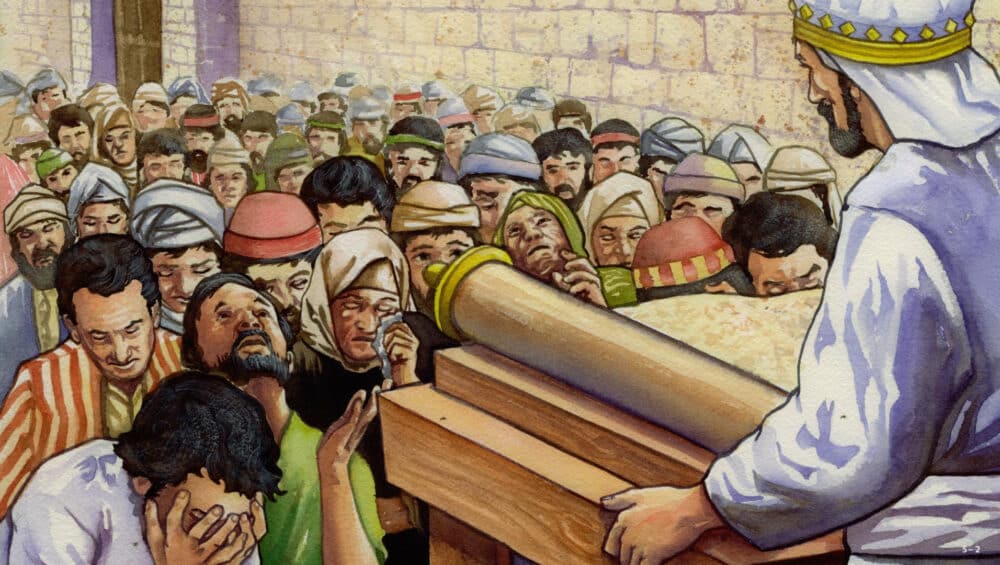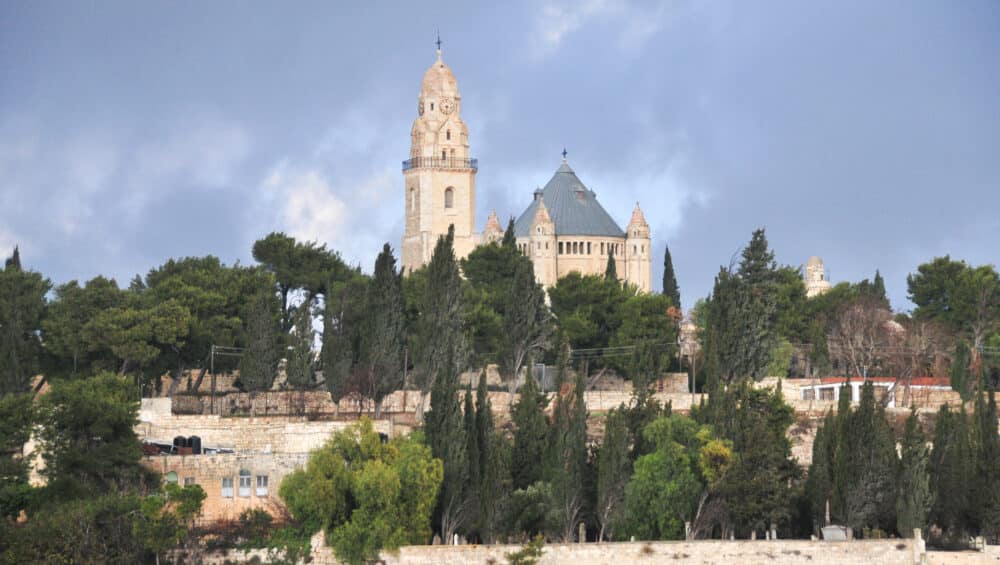Welcome to Livin’ Light’s Bible-In-A-Year challenge of discovering God’s love for us and His purpose for our lives. Here is the format for this great adventure: The daily reading assignment is posted at 5 a.m. After each day’s reading, Leigh An Coplin, the blog host, shares observations and poses questions about difficult passages to Rob Fields, who studied Christian Education at Asbury Seminary and currently teaches Biology in the Orlando area. To start from the beginning, click on 365 Bible Readings and scroll down to Day 1. The reading schedule is taken from The One Year Chronological Bible NLT.
Today’s Reading
— Psalms 75-78
(~979 BC) Click here for a timeline of the entire Bible.
Questions & Observations
Q. (Psalm 75): We have talked about deterrents — punishments that happen to people who “misbehave.” The thought of being judged for all the things I have done is a big deterrent for staying on the path to righteousness. It also helps me cope with seeing someone making unholy choices, yet living a lifestyle I may be envious of. I may not feel rewards now, but I will later. On the flip side, it is easy to think, “na nanny boo boo, I know better than you do” that those who are acting out will get their punishment. But then, a stronger feeling comes over to help them so they can also enjoy the afterlife. Is there any scripture that gives advice on how to turn people toward God without turning them away because they perceive us as “preaching,” “crazy” or a “know-it-all?”
A. There are, and I would say that they primarily come from one of Solomon’s contributions to the OT: Proverbs, the book that imparts the wisdom of the ages. Since that book is coming up soon on our little list, why don’t we hold on to this one and re-examine it down the road.
Q. (Psalm 76): The psalms have talked about God’s anger, like this one in verse 76:7. Can you explain this when we usually think that God is loving? Is it fair to compare God’s anger to a parent’s? It seems like today’s society tries to foster peaceful relationships. To children, we say use your gentle hands and nice words. Lawyers try to settle disputes in mediation. Yet — I’m not being sarcastic, just saying what I think the Bible says — our role model gets angry. Personally, I would get angry too … if I were God. Of course, I’m not and maybe that’s the answer. God can be angry, but we should try to be more loving. Maybe it’s the OT vs. the NT? Doesn’t God’s anger calm down immensely in the NT?
A. It only appears that way if you focus on Scripture from a certain perspective. Unfortunately, that perspective has become the dominant one in modern Western society: the view that God is ONLY love, and therefore would “never” be angry or judgmental about sin. But this perspective tends to gloss over — at great expense frankly — the idea that God is holy — set apart — and just, and He is in charge of what goes on and what does not. When you have a “God” who allows you to do whatever you want with the understanding that they will ALWAYS love you (how does that sound in the parent metaphor?), you can see how things can get pretty messed up pretty fast. Much of our tolerance of sin in the public eye in society today is, frankly, due to our abandoning the idea that there is an external source of justice and right and wrong — God — and when we do that, anything becomes permissible. It is certainly something that Christians should be aware of and speaking out against.
One other quick note: we all have our biases when it comes to reading Scripture: there is simply no way to avoid it. We tend to read — and mentally focus on — our favorite stories at the expense of other Scriptures that are a bit harder to reconcile with our belief system. So I am not simply attacking those who want to focus on God’s love at the expense of all else: many others can and do read scripture and see no evidence of love, but only of a wrathful God waiting to strike down sinners. If that’s what you want to see, it’s there. The trick, I think, is to not allow yourself to be closed-minded to the possibility that there is always more that God desires to teach us about Himself. If we have that mentality, I believe that we will be much less likely to fall into the trap of Biblical “bias.”
Q. (77): I completely understand that I’m not supposed to understand all of God’s reasons. It’s not my place, nor anyone else’s. I think it’s hard for humans to have patience with God, especially when we have read about his great rescuing miracles, like the parting of the Red Sea as is stated here, and wonder why he can’t grant our one simple request. I know … He has His reasons!
A. I suppose it would depend upon what the request was and why, deep down, you wanted it. Keep in mind, the nation of Israel was chosen by God not only to be His people, but to bring about salvation to the entire world through the Jewish God/man Jesus. So that, in my mind, creates a necessity for some of the places where God clearly intervenes in history: if there is no nation — because they’re wiped out by Pharaoh’s armies — then there is no salvation for the world. I think always keeping the salvation of the entire world in the back of our minds as we read through the OT is a great way to see why certain events unfold the way that they do. That certainly gives weight to some of the things God does, doesn’t it? (From Leigh An: This makes me also weave in one of Jesus’ comments when he says things have to be a certain way for the Scripture to be true.)
Q. (78:2): Why does Asaph want to teach in parables and why did Jesus?
A. Parables are a way of presenting truth in story on levels that can reach very different people in different ways. You can hear the “surface” truth and just get a good story, or if you desire, you can dig into the words and often discover greater “pearls” that the author intended to be found but not everyone will seek. That, by the way, is probably why they make such great sermons — you can attack them at multiple levels and lay the “inner” parable out for everyone to share. Jesus will address this issue in his earthly ministry in Matthew 13.
Having said that, what Asaph is doing here is using Israel’s history as instruction on what the people SHOULD be doing, and not truly disguising ideas within the words. He is not really using the “parable” concept in the same way that Jesus does. He is using it more like Stephen will do in Acts chapter 7: convict the people of their present sin by looking at sins of the past.
O. (78:40-55): This is an amazing image: God causing all of this terror to the stubborn pharaoh and his people with frogs, gnats, blood, locusts, hail, death, YET he peacefully walks the Israelites out of this plague-ridden land and protects them, like a shield.
Q. (78:65): I don’t think comparing God to a warrior waking from a drunken stupor is very respectful.
A. I agree, but it’s an interesting image, no?
Q. (78:67-68): Can you tell us again why God chose Judah’s descendants for the throne instead of Joseph, who appeared to be the chosen line?
A. I do not have a good answer to that question. From Jacob’s deathbed blessing (Genesis 48), we have seen the power of Judah grow the further we have come. The best reason I can see for the move is that Joseph’s descendants (Ephraim) were not very good leaders (they were the ones responsible for losing the Ark when it was in Shiloh), so God rejected them as the prominent tribe and selected Judah instead out of His own purposes. This will continue with Jesus, whom Revelation will call the Lion of Judah (Rev 5:5).
For further reading: Where did evil come from? https://www.focusonthefamily.com/family-qa/what-the-bible-says-about-the-origin-of-evil/
Shop: Christian shirts get noticed. Check out these conversation starters: https://livinlight.org/shop/
Tomorrow’s reading: Psalms 79-82















